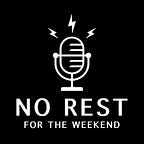Yet There is Method — FOR MADMEN ONLY
Review by William J. Hammon, ActuallyPaid.com
There’s always a fascination in the idea of inspiration. There’s a veritable ocean of documentaries about great artists in various forms of entertainment, from music to film and everything in between. But rarely do we focus on those who gave the greats the tools needed for success. There’s a reason they’re called “unsung” heroes, after all. But every once in a while, we get a detailed look at the man behind the curtain and his influence on the craft. That’s where Heather Ross’ film, For Madmen Only comes in.
As narrator Michaela Watkins (Big Mouth, The Unicorn) tells us in the opening, if you’re not a comedian, you’ve likely never heard of Del Close, but if you are, you know he’s responsible for grooming some of the greatest talent of the last few generations. Among his most notable credits are directing at Second City and revolutionizing improvisation through his “Harold” method of long-form staging. He taught dozens of legendary comics, but never captured their level of fame for himself, in part due to severe mental and substance abuse issues. But more importantly, he became a lodestar for creative misfits, people who weren’t traditional Hollywood types, because he himself was about as far from that model as one could get.
Using a combination of archive footage, interviews, animation, and a wonderfully staged recreation of his process (featuring Matt Walsh and Rusty Venture himself, James Urbaniak), Ross does her absolute best to delve into Del’s mind, equally welcoming of the genius and the darkness that entails. The film is brutally honest about Del’s skeletons, from his father’s suicide (a literally incredible story) to his drug addictions, but it also takes delicate care to show how his twisted life informed his twisted art, and how every facet of his personality — positive and negative — was basically codependent on the others to make it all work.
Of particular interest is Wasteland, a comic book series written for DC by Close and John Ostrander. It’s the main focus of the filmed scenes, the dialogue of which was taken from actual audio recordings of Close as the book was being written. Ostensibly a horror anthology with comedic elements, Wasteland is an autobiographical allegory, giving life and spark to Close’s innermost demons, and testing the limits of what could be considered acceptable. Through these scenes, we see a man dedicated to making sure everything was on the table, or nothing was, and even if you disagree with his methods, it’s an attitude to be lauded for sure.
There’s a macabre glee to the whole of the film, mostly because Close’s legacy is so intertwined with his own morbidity, both figurative and literal. Watkins tells us very early that we’re talking about a delightful dead man, and pulls no punches with bold statements like calling Bob Hope a shit comic (a statement I don’t agree with, but an intriguing argument nonetheless). The fatalism pervades, but in an oddly life-affirming way, because when it was all said and done, Del’s goal was to get his performers to think outside the normal parameters, give it their all, and get not just laughs from the audiences they faced, but uproarious applause.
But for all the complexities of his craft, the film demonstrates that he was, on the whole, a fairly simple man. He had his issues, same as the rest of us, but he was pretty straightforward. He knew what he wanted and didn’t compromise, for better or worse. It’s equally refreshing to hear Bob Odenkirk tell a story about interviewing him in an apartment with a busted window during a Chicago winter as it is to hear Dave Thomas relay that when Del worked in Toronto, he nearly had a mutiny on his hands because the cast simply did not like him.
He’s a naked soul laid bare before the world, take him or leave him. Even his appearance is a challenge in and of itself. In his later years he spoke with a voice resembling Tom Brokaw while sporting facial hair closer to Gene Shalit than anything else. No matter what your opinion of him ends up being, you’re forced to deal with him, to reconcile whatever preconceived notions you might have, because he won’t let you get away with being fake. That’s as true when he’s butting heads with Second City management, going on a complete non-sequitur diatribe with the suits at DC, or in greeting friends on his deathbed at a “birthday” party (he died five days before his 65th) hosted by Bill Murray.
It’s impossible to not react to him, which at its heart is what comedy is all about. You have to surprise people. You have to be unexpected. You have to make an impression. Del Close surely did. And that’s what For Madmen Only expertly gets across.
Originally published at https://behindtherabbitproductions.wordpress.com on July 16, 2021.
